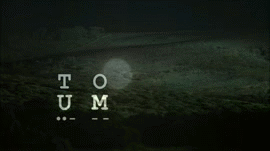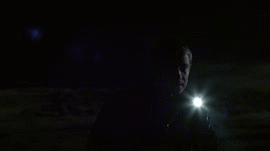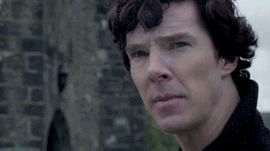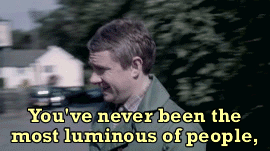
BBC Sherlock Fan Forum - Serving Sherlockians since February 2012.
- nakahara
- Threatened Knighthood
 Offline
Offline 
- Registered: February 22, 2014
- Posts: 11,979
Re: Johnlock: The Official Debate
Whisky wrote:
@nakahara: I think the argument of heteronormativity can be overused. Who says people would see romantic coding if John was a female? Is it possible just to not see? In either constellation?
I bet that if John was female, everybody would be convinced that she and Sherlock are an item by now. If few giggles from Janine and few words about Lady Carmichael were enough to make Sherlock look as if he was attracted to them, there´s no way his conduct around John would be seen as something other than romantic affair.... it much more full of these romantic gestures.
Whisky wrote:
But my question was, why does Sherlock think about a naked Irene and not a naked John? I see sherlock and John confessing love in tSoT, too. But is it platonic? Or sexual? do we get this answer? I'm missing proof, but I do have proof that Sherlock knows that Irene is using sexual elements in her approach to him. he recognizes them. why does he never think of John naked? It would be logical. Instead they code Moriarty with sexual innuend -why? also, why doesn't Sherlock have johns picture in a frame around his neck?
I just don't understand that technique.
As I already pointed above, other than Irene Adler, we never see people naked in this show. Irene appears naked in Sherlock´s MP in TSOT because that´s how he first saw her in RL, IMHO. Other than that, people, even those in love, are only seen fully clothed in this show - and yet we don´t doubt their relationships...
If we demand naked John, then why not naked Mary? Is she really married to John? We never saw them naked together...
These women in Sherlock´s MP? Why doesn´t he imagine them naked? It´s his imagination and if he´s not gay, why doesn´t he imagine something racy about them?
On the other hand, we saw almost naked Janine - and then it was revealed to us, that her and Sherlock´s relationship was entirely fake.
Nakedness is not the proof of romantic attraction in this show and in this setting, really.
And Irene´s picture as a token is taken straight from the Canon and appears in all versions of the story. Granada version featured it every time Jeremy Brett´s Holmes opened his drawer. As such, it speaks about Sherlock´s admiration to his "female foe" but nothing about his attraction to her...
Story-wise, Sherlock´s MP closely mirrors real-life Victorian Era with all its trappings, no matter if its his imagination or not. It would be weird to wear tokens with naked John in that age - it could land Sherlock in prison.
Whisky wrote:
What I want to say is... Why don't they code John obviously? Like: naked, or in a frame round Sherlocks neck, plain obvious love interest? why should i assume that lingering glances have deeper meaning than tokens? And also, sherlock risks his life for Irene. or at least I assume his rescue mission was dangerous like that. And we know about the love between john and sherlock, just not about the romantic or not part. a naked john would help out nicely, imo.
And what do they code obviously? They don´t code even Sherlock´s drug-use obviously, althrough it´s one of the main themes of TAB. They love to mess with us.
With the exception of Irene Adler´s phone (the substitute of the photo I mentioned above), we never see Sherlock collect tokens. He is not sentimental like that, I presume. But I don´t see why his relationship to John should only be valid after giving-receiving tokens.
Sherlock does risk life for Irene, but he absolutely sacrifices it for John, both in TRF and in HLV. He even forgiven a bullet to his chest for the sake of John. His sacrifice in both cases was monumental for John. Why is his risk for Irene taken as a proof of his feelings and his risk for John is dismissed?
-----------------------------------
I cannot live without brainwork. What else is there to live for? Stand at the window there. Was there ever such a dreary, dismal, unprofitable world? See how the yellow fog swirls down the street and drifts across the dun-coloured houses. What could be more hopelessly prosaic and material? What is the use of having powers, Doctor, when one has no field upon which to exert them?

- Harriet
- Most Human Human Being
 Offline
Offline 
- From: 110A Piccadilly
- Registered: August 24, 2012
- Posts: 9,887
Re: Johnlock: The Official Debate
nakahara wrote:
There must be some reason while Sherlock feels such fear of women and distrusts them and why he at the same time feels the magnetic allure coming from the man, even if the man is his enemy...
Sherlock being gay is one of those possible solutions.
Oh, don't say that, I think it would be unfair towards most gay men who have no issues with women (or less than the average straight male ![]() )
)
Eventually everyone will support Johnlock. Independent OSAJ Affiliate
... but there may be some new players now. It’s okay. The East Wind takes us all in the end.
- Harriet
- Most Human Human Being
 Offline
Offline 
- From: 110A Piccadilly
- Registered: August 24, 2012
- Posts: 9,887
Re: Johnlock: The Official Debate
Vhanja wrote:
I've seen a good list of romantic tropes being used in Sherlock. However, I believe some of those tropes are also used on friends.
How about the others?
Eventually everyone will support Johnlock. Independent OSAJ Affiliate
... but there may be some new players now. It’s okay. The East Wind takes us all in the end.
- nakahara
- Threatened Knighthood
 Offline
Offline 
- Registered: February 22, 2014
- Posts: 11,979
Re: Johnlock: The Official Debate
Harriet wrote:
nakahara wrote:
There must be some reason while Sherlock feels such fear of women and distrusts them and why he at the same time feels the magnetic allure coming from the man, even if the man is his enemy...
Sherlock being gay is one of those possible solutions.Oh, don't say that, I think it would be unfair towards most gay men who have no issues with women (or less than the average straight male
)
![]()
I only speak about Sherlock here, I´m not reffering to it as if this behaviour was typical for gay men in general.
-----------------------------------
I cannot live without brainwork. What else is there to live for? Stand at the window there. Was there ever such a dreary, dismal, unprofitable world? See how the yellow fog swirls down the street and drifts across the dun-coloured houses. What could be more hopelessly prosaic and material? What is the use of having powers, Doctor, when one has no field upon which to exert them?

- tonnaree
- The "B" is SILENT! (Mod)
 Offline
Offline 
- From: Atlanta, Georgia, USA
- Registered: May 31, 2013
- Posts: 9,270
Re: Johnlock: The Official Debate
I would like to say that, regardless of my firmly pro-Johnlock position, I would fully support having a naked John in an episode. ![]()
----------------------------------------------------------------------
Proud President and Founder of the OSAJ.
Honorary German
"Anyone who takes himself too seriously always runs the risk of looking ridiculous; anyone who can consistently laugh at himself does not".
-Vaclav Havel
"Life is full of wonder, Love is never wrong." Melissa Ethridge
I ship it harder than Mrs. Hudson.


- Harriet
- Most Human Human Being
 Offline
Offline 
- From: 110A Piccadilly
- Registered: August 24, 2012
- Posts: 9,887
Re: Johnlock: The Official Debate
Your mentioning of "being gay" as a possible reason for misogyny appeared a little more generally spoken to me. Glad you put it right now ![]()
Eventually everyone will support Johnlock. Independent OSAJ Affiliate
... but there may be some new players now. It’s okay. The East Wind takes us all in the end.
- nakahara
- Threatened Knighthood
 Offline
Offline 
- Registered: February 22, 2014
- Posts: 11,979
Re: Johnlock: The Official Debate
Harriet wrote:
Your mentioning of "being gay" as a possible reason for misogyny appeared a little more generally spoken to me. Glad you put it right now
That was really not the case. I only think that Sherlock as a literary and on-screen character has this slightly misogynist streak in him - he does not hate women, but he slightly fears them and distrust them, IMHO.
-----------------------------------
I cannot live without brainwork. What else is there to live for? Stand at the window there. Was there ever such a dreary, dismal, unprofitable world? See how the yellow fog swirls down the street and drifts across the dun-coloured houses. What could be more hopelessly prosaic and material? What is the use of having powers, Doctor, when one has no field upon which to exert them?

- Harriet
- Most Human Human Being
 Offline
Offline 
- From: 110A Piccadilly
- Registered: August 24, 2012
- Posts: 9,887
Re: Johnlock: The Official Debate
Fine ![]()
(When thinking about Sherlock, "misogyny" would be one of the last things to come on my mind, though... might need to think it over.)
Eventually everyone will support Johnlock. Independent OSAJ Affiliate
... but there may be some new players now. It’s okay. The East Wind takes us all in the end.
- tonnaree
- The "B" is SILENT! (Mod)
 Offline
Offline 
- From: Atlanta, Georgia, USA
- Registered: May 31, 2013
- Posts: 9,270
Re: Johnlock: The Official Debate
Lately I have been watching ASiP repeatedly. I am obsessed with the scene in Angelo's.
WHY is that conversation even in the show? I'm assuming a lot of thought and effort go into the scripts for Sherlock. I know that film is expensive. If something is written and filmed, no matter how superficial it may seem, it's important.
If you were to transcribe this conversation and change John's name to Joan, no one would doubt that Joan was flirting a little and trying to determine Sherlock's orientation and possible interest.
There is no narrative reason for the conversation to go the way it does.
If, as many suggest, this is just a case of John getting to know his new flatmate the conversation could've been about ANYTHING! Sports! John could've ask Sherlock about his favorite rugby team and Sherlock could've replied "sports, not really my area." But no, it was written as flirting with a bit of sexual tension in the air.
Last edited by tonnaree (January 26, 2016 4:53 pm)
----------------------------------------------------------------------
Proud President and Founder of the OSAJ.
Honorary German
"Anyone who takes himself too seriously always runs the risk of looking ridiculous; anyone who can consistently laugh at himself does not".
-Vaclav Havel
"Life is full of wonder, Love is never wrong." Melissa Ethridge
I ship it harder than Mrs. Hudson.


- Whisky
- On The Side Of The Angels
 Offline
Offline 
- From: cosy hobbit cave in Germany
- Registered: September 4, 2013
- Posts: 1,189
Re: Johnlock: The Official Debate
I'm really confused now. I feel like as soon as I don't see Johnlock romance, I must be biased by a heteronormative mindset. How do I get out of this trap? (and if we already use the word discrimination, which I don't see happening here btw, can we allow for lgbt people to see non-Johnlock too?)
About John and Mary: they married, which is a way of proclaiming romantic love, a way which is widely interpreted as being romantically motivated. I don't need to see the sex therefore. But it's not like John and Sherlock marry officially, so where is their doubtfree romantic act? People take bullets and risk death for siblings, friends, even for strangers, why is that proof of romance?
About Angelos: I would ask flatmates that pretty soon, too. Because their boy/girlfriends might come round, into my flat, because I want to be sure the other one is not attracted to me so there won't be trouble. I find it normal. You find it suggestive. i don't necessarily do. I would also welcome if they were in the same relationship status as I am.
That's what I'm trying to say. Of course our argument here isn't about our reception of the scene, but about the intention of the writers, too. And that second layer makes it difficult, because my opinion of friendship in that scene cannot be uphold when we already assumed that the writers obviously try to show romance.
Last edited by Whisky (January 26, 2016 4:44 pm)
_____________________________________________________________
"It is what it is."

- nakahara
- Threatened Knighthood
 Offline
Offline 
- Registered: February 22, 2014
- Posts: 11,979
Re: Johnlock: The Official Debate
Whisky wrote:
About John and Mary: they married, which is a way of proclaiming romantic love, a way which is widely interpreted as being romantically motivated. I don't need to see the sex therefore. But it's not like John and Sherlock marry officially, so where is their doubtfree romantic act? People take bullets and risk death for siblings, friends, even for strangers, why is that proof of romance?
In criminalistics there is a nice maxim: you can´t take clue at the face value if it´s not being corroborated by facts of the case.
If we have marriage but it´s not corroborated by a loving behaviour from people involved, then we could hardly call it romance. And in John-Mary´s case there´s not much warmth and affection in their relationship. I certainly feel more "corroboration" coming from Sherlock-John connection than from John-Mary connection...
If taking risk of death is also possible for strangers just for the risk´s sake, then why did you use the argument "but Sherlock risked his life for Irene" in support of there being a romance between them originally?
-----------------------------------
I cannot live without brainwork. What else is there to live for? Stand at the window there. Was there ever such a dreary, dismal, unprofitable world? See how the yellow fog swirls down the street and drifts across the dun-coloured houses. What could be more hopelessly prosaic and material? What is the use of having powers, Doctor, when one has no field upon which to exert them?

- nakahara
- Threatened Knighthood
 Offline
Offline 
- Registered: February 22, 2014
- Posts: 11,979
Re: Johnlock: The Official Debate
Whisky wrote:
That's what I'm trying to say. Of course our argument here isn't about our reception of the scene, but about the intention of the writers, too. And that second layer makes it difficult, because my opinion of friendship in that scene cannot be uphold when we already assumed that the writers obviously try to show romance.
But most people didn´t start watching Sherlock with the expectation that they would watch romance. They only concluded there´s romance in the story after seeing how the story is framed, filmed, acted and what is insinuated in it...
-----------------------------------
I cannot live without brainwork. What else is there to live for? Stand at the window there. Was there ever such a dreary, dismal, unprofitable world? See how the yellow fog swirls down the street and drifts across the dun-coloured houses. What could be more hopelessly prosaic and material? What is the use of having powers, Doctor, when one has no field upon which to exert them?

- besleybean
- Threatened Knighthood
 Offline
Offline 
- From: Carnoustie, Angus, Scotland.
- Registered: October 4, 2012
- Posts: 21,376
Re: Johnlock: The Official Debate
And others(watching the same show) don't see any romance between Sherlock and John at all.
So where does this leave us?
---------------------------------------------------------------------------------------------------------------------------------------------------------------
- Harriet
- Most Human Human Being
 Offline
Offline 
- From: 110A Piccadilly
- Registered: August 24, 2012
- Posts: 9,887
Re: Johnlock: The Official Debate
Whisky wrote:
I'm really confused now. I feel like as soon as I don't see Johnlock romance, I must be biased by a heteronormative mindset. How do I get out of this trap? (and if we already use the word discrimination, which I don't see happening here btw, can we allow for lgbt people to see non-Johnlock too?)
I don't think you need to be confused, If you don't have such mindset, no need to worry or feel like in a trap.
But it might be interesting to listen to lgbt Johnlockers' ideas since we have them around.
Eventually everyone will support Johnlock. Independent OSAJ Affiliate
... but there may be some new players now. It’s okay. The East Wind takes us all in the end.
- Whisky
- On The Side Of The Angels
 Offline
Offline 
- From: cosy hobbit cave in Germany
- Registered: September 4, 2013
- Posts: 1,189
Re: Johnlock: The Official Debate
nakahara wrote:
Whisky wrote:
About John and Mary: they married, which is a way of proclaiming romantic love, a way which is widely interpreted as being romantically motivated. I don't need to see the sex therefore. But it's not like John and Sherlock marry officially, so where is their doubtfree romantic act? People take bullets and risk death for siblings, friends, even for strangers, why is that proof of romance?
In criminalistics there is a nice maxim: you can´t take clue at the face value if it´s not being corroborated by facts of the case.
If we have marriage but it´s not corroborated by a loving behaviour from people involved, then we could hardly call it romance. And in John-Mary´s case there´s not much warmth and affection in their relationship. I certainly feel more "corroboration" coming from Sherlock-John connection than from John-Mary connection...
If taking risk of death is also possible for strangers just for the risk´s sake, then why did you use the argument "but Sherlock risked his life for Irene" in support of there being a romance between them originally?
because it's not proof. I just wanted to make clear that it's as much proof as the other way round. So if saving people means romance - i didn't say that - it means it either way.
_____________________________________________________________
"It is what it is."

- Ho Yay
- Cipher Expert
 Offline
Offline 
- Registered: September 12, 2015
- Posts: 126
Re: Johnlock: The Official Debate
Why do you need an immediate extreme act in the middle of a romantic arc characterized by a will the won't they trope, when the doubtfree romantic coding already establishes a romantic arc? In arcs the end goes at the end.
Heteronormativity is something almost everybody that I know that is not queer has. Some queer people have it too because they have grown up in an heteronormative world. My own best friends have it and I have to correct them. It's something very widespread and people who think like that normally don't notice because it's in the nature of the concept not noticing. It's a discrimination in perception that is not voluntary.
Likewise I am generally blind to my normativity against other discriminated groups I don't belong to, it's not that I have to escape a trap, I have to learn and come to understand exactly what kind of discrimination I am doing.
Saving people it's only a small part of the romantic coding, and the after-saving between sherlock and john is coded with romantic tension (stares, mouvements of the mouth, proximity, dinner).
Last edited by Ho Yay (January 26, 2016 4:59 pm)
- besleybean
- Threatened Knighthood
 Offline
Offline 
- From: Carnoustie, Angus, Scotland.
- Registered: October 4, 2012
- Posts: 21,376
Re: Johnlock: The Official Debate
The team have said they were both aware of the sniggers about Holmes and Watson and also what some people might say(because people talk...that's what they do) about Sherlock and John.
So they decided to deal with it by making a joke of it.
---------------------------------------------------------------------------------------------------------------------------------------------------------------
- Harriet
- Most Human Human Being
 Offline
Offline 
- From: 110A Piccadilly
- Registered: August 24, 2012
- Posts: 9,887
Re: Johnlock: The Official Debate
Whisky wrote:
because it's not proof. I just wanted to make clear that it's as much proof as the other way round. So if saving people means romance - i didn't say that - it means it either way.
But the whole context of evidence is important. One cannot take each ingredient for itself, as you do when talking about marriage as evidence for romance, for example.
Eventually everyone will support Johnlock. Independent OSAJ Affiliate
... but there may be some new players now. It’s okay. The East Wind takes us all in the end.
- Ho Yay
- Cipher Expert
 Offline
Offline 
- Registered: September 12, 2015
- Posts: 126
Re: Johnlock: The Official Debate
If that were the case it is queerbaiting.
It is also offensive the idea that queer people should presume romantic tropes on them are a joke.
- besleybean
- Threatened Knighthood
 Offline
Offline 
- From: Carnoustie, Angus, Scotland.
- Registered: October 4, 2012
- Posts: 21,376
Re: Johnlock: The Official Debate
I would never take marriage as evidence of romance.
However, lack of romance may not alter the fact that somebody is happy in a freely chosen marriage.
Likewise, just because a marriage isn't romantic, it doesn't necessarily mean either partner wants somebody else.
---------------------------------------------------------------------------------------------------------------------------------------------------------------





